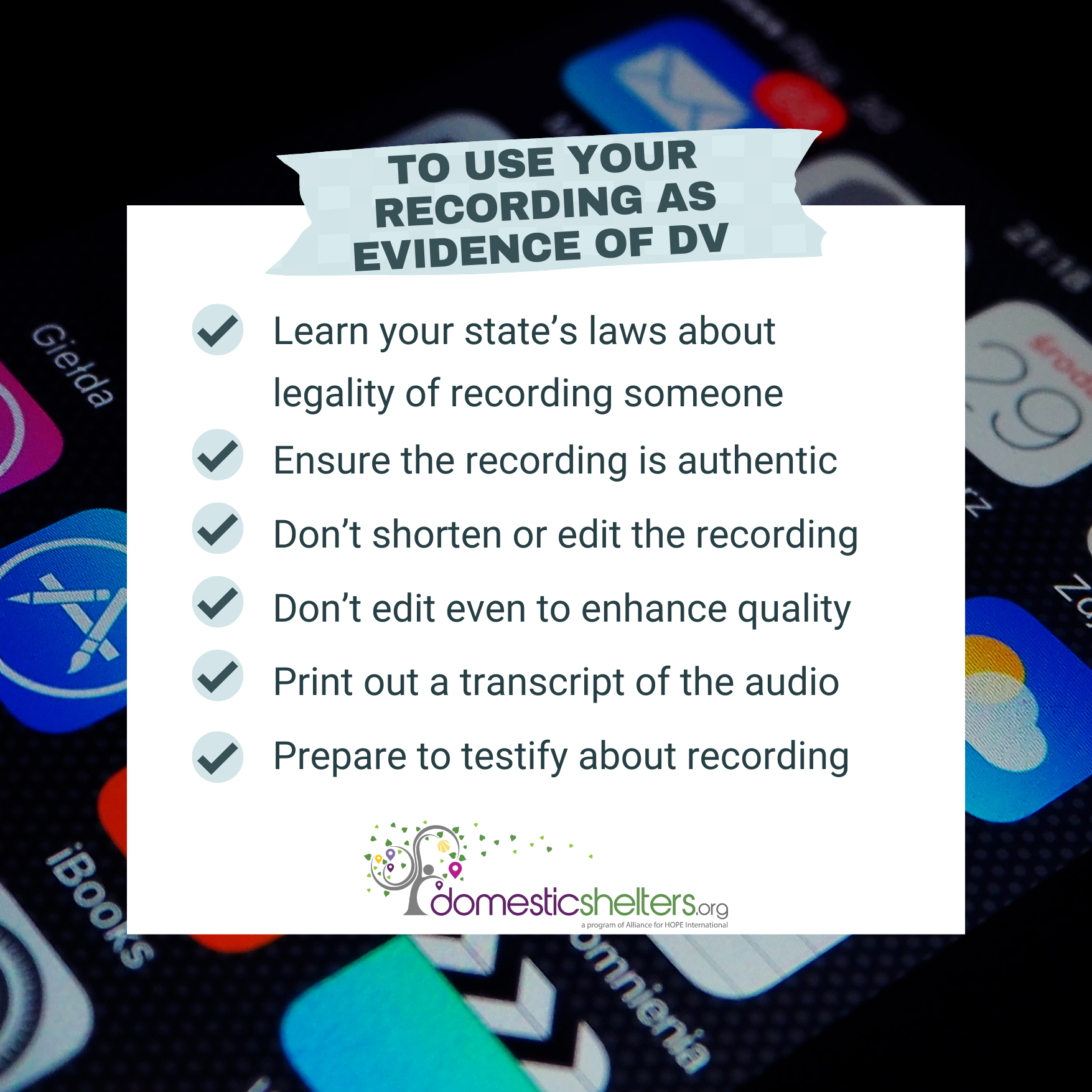1. Select a discrete app icon.

notes
Can I Record My Husband Yelling at Me?
What to know about recording abuse — and how to do it safely
- Aug 19, 2024

If they would just see how he treats me, they’d believe me.
If you’ve ever thought this, you may have asked yourself questions like: Is it legal to record someone abusing me? Can I record my husband yelling at me? Is it OK to show the recordings to the police?
In most cases, the answer to these questions is yes. But understanding the legality around recording someone abusing you is only part of the story. Be sure you understand all of the considerations prior to pressing that red circle on your phone.
The Legality of Recording Someone
The legality of recording someone abusing you varies by state and situation. First, “we must differentiate between when somebody’s abusing you in person and when somebody’s abusing you over the phone,” says Nancy S. Erickson, an attorney and consultant on domestic violence legal issues.
In short, the legality of recording phone conversations depends on whether you live in what’s called a one-party consent state or two-party consent state. In one-party consent states, you can legally record a conversation as long as one party (you) consents to the recording. In two-party consent states, all parties involved in the conversation must be informed of and agree to the recording. Learn more about the nuances of recording phone calls to document abuse.
When it comes to in-person interactions, recording someone in public is generally accepted as there’s no “expectation of privacy.” The rules on recording someone in private, however, are more complex, especially when the person isn’t aware they’re being recorded.
Hidden cameras are legal in most states, as long as they’re not capturing video where someone has a reasonable expectation of privacy, such as a bathroom, bedroom or changing room. But a portion of states outlaw the use of hidden cameras everywhere. Be aware of your state’s laws.

Entering Recordings as Court Evidence
Even if you legally record abuse, presenting that recording in court can be challenging.
“Some judges just don’t like it if you record, and it has nothing to do with legality,” Erickson says. “It just has to do with the judge not liking it or not wanting to deal with it.”
Unfortunately, this means recordings aren’t always allowed to be presented in court proceedings. And even if they are, they might not be considered by the judge. To increase the chances of your recording being accepted as evidence, ensure it is authentic and unedited. Don’t alter the recording in any way like shortening it or editing it, even to enhance its quality. And be prepared to testify to the recordings’ authenticity and the context in which it was made.
To increase your chances of the recording being admissible, print out a transcript of the audio for the court.
“Judges don’t like to listen to these things,” she says. “They are much more inclined to read a transcript, though.”
Is It Safe to Record An Abuser?
Recording an abuser can be a double-edged sword. While it might provide crucial evidence for use in a family court case or to file a police report, it could also have the effect of escalating the situation.
“I’ve seen incidents where these guys go ballistic when they know they’re being recorded,” Erickson says. “So, certainly, use caution if you’re thinking about doing so, especially when no one else is around.”
To mitigate this risk, consider safer ways to record abuse. For instance, rather than holding your phone up like you would to capture a photo, begin the recording discreetly, even if that means the abuser isn’t in frame. Recording just audio may be safer and more discreet than video and can often tell the same story. Some life saving apps allow you to discreetly record and automatically upload the footage to a secure cloud service, ensuring the evidence is preserved even if your phone is taken or destroyed. Always be cautious and prioritize your safety over obtaining recordings.
It’s also important to be aware that an abuser might record you as a means of control or instigation. They might record you during arguments to manipulate the narrative and paint you as the abuser or to intimidate or harass you. In such situations, it’s best to go silent and walk away, if possible.
If possible, secure other types of evidence in addition to or lieu of a recording, which can help to bolster your case if you choose to file for an order of protection or file charges for abuse. For a list of evidence examples, read “Ways Survivors Can Collect Evidence of Abuse.”
Donate and change a life
Your support gives hope and help to victims of domestic violence every day.







